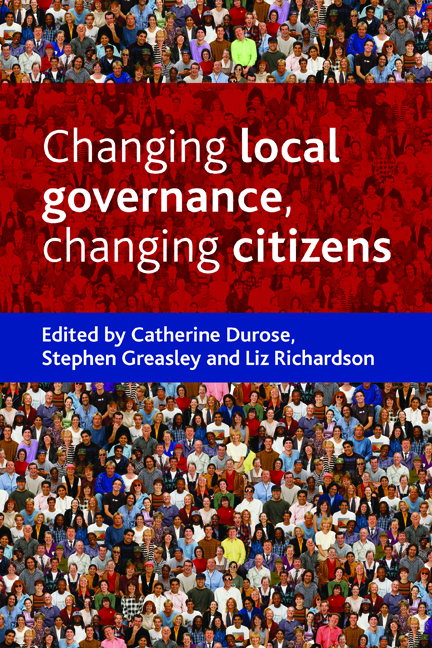Book contents
- Frontmatter
- Dedication
- Contents
- List of boxes and tables
- Acronyms
- Notes on contributors
- Acknowledgments
- Foreword
- Preface
- one Changing local governance, changing citizens: introduction
- two Citizen governance: where it came from, where it’s going
- three ‘Neighbourhood’: a site for policy action, governance … and empowerment?
- four Urban housing market restructuring and the recasting of neighbourhood governance and community
- five Citizen aspirations: women, ethnicity and housing
- six Can we promote cohesion through contact? Intergroup contact and the development of community cohesion
- seven New migrants, citizenship and local governance: ‘Poles’ apart?
- eight Citizens of faith in governance: opportunities, rationales and challenges
- nine Citizens’ reflections on behaviour change policies
- ten Every child’s voice matters?
- eleven e-citizenship: reconstructing the public online
- twelve Conclusion
- Index
seven - New migrants, citizenship and local governance: ‘Poles’ apart?
Published online by Cambridge University Press: 16 July 2022
- Frontmatter
- Dedication
- Contents
- List of boxes and tables
- Acronyms
- Notes on contributors
- Acknowledgments
- Foreword
- Preface
- one Changing local governance, changing citizens: introduction
- two Citizen governance: where it came from, where it’s going
- three ‘Neighbourhood’: a site for policy action, governance … and empowerment?
- four Urban housing market restructuring and the recasting of neighbourhood governance and community
- five Citizen aspirations: women, ethnicity and housing
- six Can we promote cohesion through contact? Intergroup contact and the development of community cohesion
- seven New migrants, citizenship and local governance: ‘Poles’ apart?
- eight Citizens of faith in governance: opportunities, rationales and challenges
- nine Citizens’ reflections on behaviour change policies
- ten Every child’s voice matters?
- eleven e-citizenship: reconstructing the public online
- twelve Conclusion
- Index
Summary
‘I work, I pay my taxes, I have a right to live here like everybody else.’ (Polish migrant woman interviewed by Rageh Omaar for Channel 4 Dispatches: Immigration: the inconvenient truth, 21 April 2008)
‘Four out of five migrants take more from economy than they put back’ (Headline of article by James Slack, Daily Mail, 29 August 2006)
The question as to whether new migrants have a right to be engaged in British politics and society on an equal basis has been hotly debated in the media. This chapter moves away from the normative positions behind these headlines to consider ways in which such politics are played out on the ground at the local level. More specifically within the context of this volume, the chapter questions whether Polish migrants (as the largest group of UK new migrants) are included in the renegotiation of citizenship and local governance? The chapter considers this question by exploring to what extent, and on what terms, Polish migrants are invited to the negotiation table. In particular the chapter will consider the way in which the transient existence and limited citizenship of new migrants impacts on the possibilities for their inclusion. As will be discussed, the literature suggests that factors relating to the social and formal status of new migrants place serious restrictions on inclusion in the political and social practices of citizenship. The effects that such factors have on new migrants’ inclusion are discussed. In addition to this it is suggested that the dynamics of the governance arrangements and the locality in which new migrants find themselves is significant when considering such effects in relation to the political engagement of new migrants.
The chapter is structured as follows: First, the rationale behind this topic and the debates in the literature around citizenship and local governance as they relate to new migrants are discussed. Next, the contours of the research project will be described, before the final two sections set out both the challenges and opportunities for inclusion in citizenship and local governance engagement that currently exist at the local level.
Globalisation, citizenship and local governance
Policy makers have increasingly recognised the challenges to citizenship that the phenomenon of globalisation presents.
- Type
- Chapter
- Information
- Changing Local Governance, Changing Citizens , pp. 91 - 110Publisher: Bristol University PressPrint publication year: 2009



